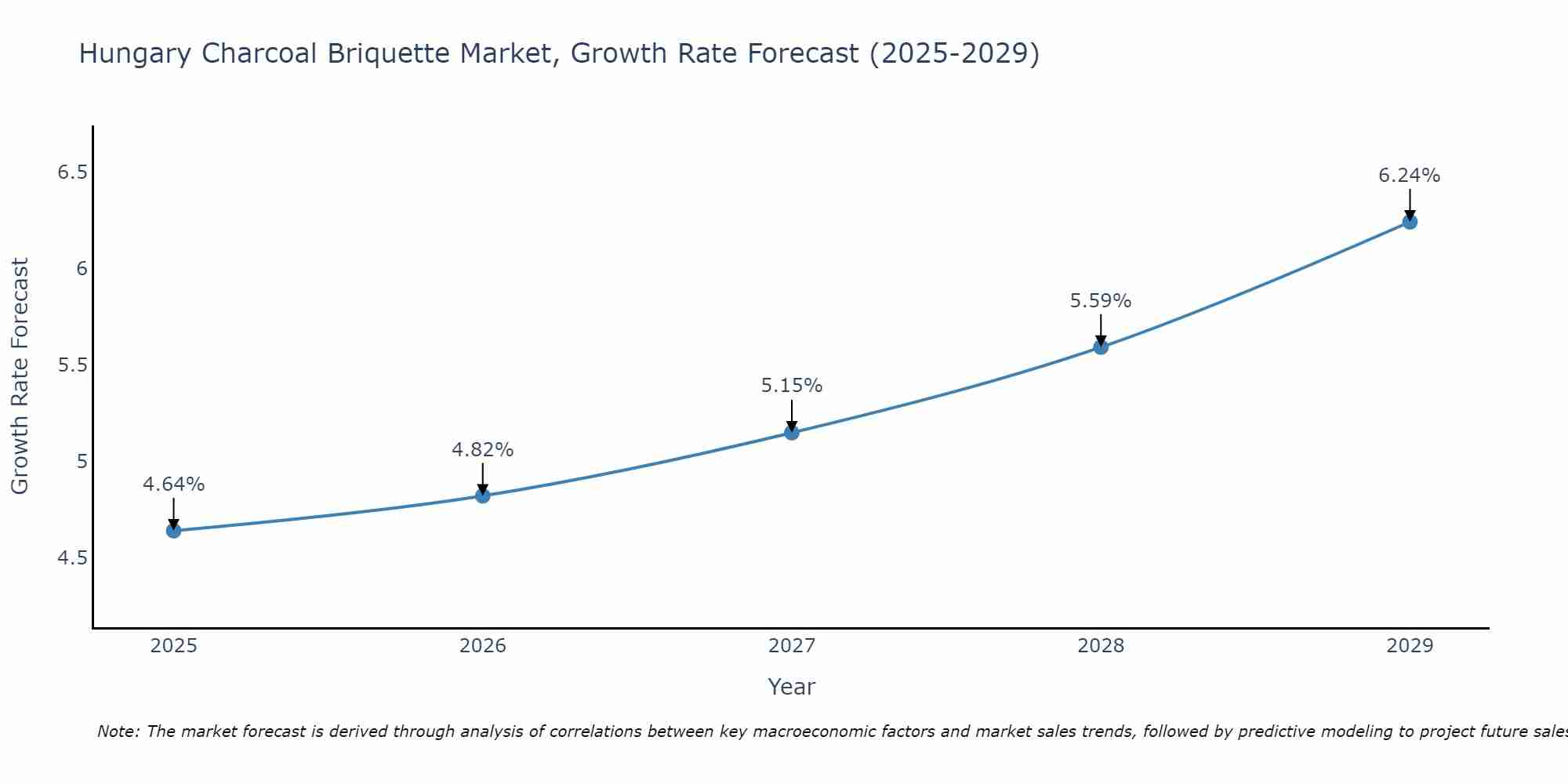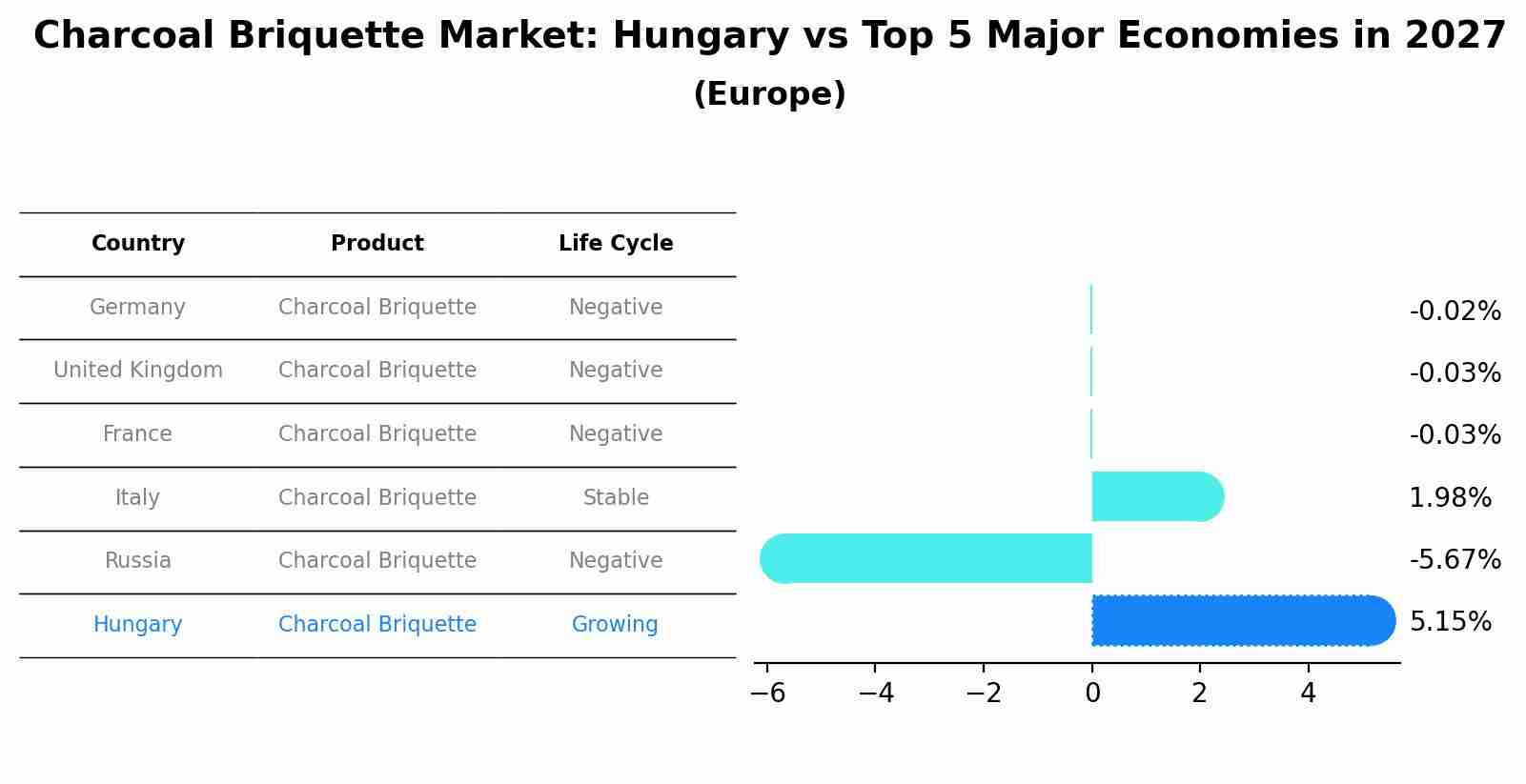Hungary Charcoal Briquette Market Outlook | COVID-19 IMPACT, Revenue, Share, Trends, Growth, Value, Forecast, Companies, Analysis, Industry & Size
| Product Code: ETC286519 | Publication Date: Aug 2022 | Updated Date: Jul 2025 | Product Type: Market Research Report | |
| Publisher: 6Wresearch | Author: Sachin Kumar Rai | No. of Pages: 75 | No. of Figures: 35 | No. of Tables: 20 |
Hungary Charcoal Briquette Market Size Growth Rate
The Hungary Charcoal Briquette Market is likely to experience consistent growth rate gains over the period 2025 to 2029. From 4.64% in 2025, the growth rate steadily ascends to 6.24% in 2029.

Charcoal Briquette Market: Hungary vs Top 5 Major Economies in 2027 (Europe)
The Charcoal Briquette market in Hungary is projected to grow at a growing growth rate of 5.15% by 2027, highlighting the country's increasing focus on advanced technologies within the Europe region, where Germany holds the dominant position, followed closely by United Kingdom, France, Italy and Russia, shaping overall regional demand.

Hungary Charcoal Briquette Market Overview
The Hungary Charcoal Briquette Market is witnessing steady growth due to the increasing demand for eco-friendly and sustainable fuel alternatives. Charcoal briquettes are preferred for their clean-burning properties, longer burn time, and consistent heat output, making them popular for grilling and cooking purposes. The market is driven by the rising awareness about environmental impact, as charcoal briquettes produce less smoke and ash compared to traditional charcoal. Additionally, the convenience factor of charcoal briquettes, such as easy ignition and handling, is contributing to their growing popularity among consumers. The market is characterized by the presence of both domestic and international manufacturers offering a variety of charcoal briquette products, catering to the diverse needs and preferences of the Hungarian consumers. Overall, the Hungary Charcoal Briquette Market is poised for further expansion as consumers increasingly prioritize sustainability and efficiency in their fuel choices.
Hungary Charcoal Briquette Market Trends
The Hungary Charcoal Briquette Market is currently experiencing a shift towards environmentally friendly and sustainable products. Consumers are increasingly opting for charcoal briquettes made from natural and renewable sources, such as bamboo or coconut shells, due to growing environmental concerns. Additionally, there is a rising demand for charcoal briquettes that are free from chemicals and additives, catering to health-conscious consumers. Convenience is also a key trend, with a preference for easy-to-light and long-burning charcoal briquettes. Furthermore, the market is witnessing a surge in innovative packaging solutions to enhance product appeal and shelf visibility. Overall, the Hungary Charcoal Briquette Market is moving towards eco-friendly, high-quality products that offer convenience and health benefits to consumers.
Hungary Charcoal Briquette Market Challenges
In the Hungary Charcoal Briquette Market, some challenges are the increasing competition among manufacturers, fluctuating raw material prices, and the impact of environmental regulations. The market is becoming more competitive with new players entering the industry, leading to pricing pressures and the need for companies to differentiate their products. Fluctuating prices of raw materials, such as wood or coconut husks, can affect production costs and profit margins. Additionally, environmental regulations aimed at reducing carbon emissions and promoting sustainable practices can pose challenges for companies operating in the charcoal briquette market. Adapting to these challenges by improving efficiency, innovating in product development, and ensuring compliance with regulations will be crucial for companies to thrive in the Hungary Charcoal Briquette Market.
Hungary Charcoal Briquette Market Investment Opportunities
In the Hungary Charcoal Briquette Market, there are several investment opportunities to consider. One option is to invest in the production and distribution of high-quality, environmentally friendly charcoal briquettes made from sustainable sources. This could cater to the increasing demand for eco-friendly alternatives to traditional charcoal products. Another opportunity lies in investing in innovative packaging solutions or marketing strategies to differentiate products and capture a larger market share. Additionally, investing in R&D to develop new charcoal briquette formulations or production methods could lead to a competitive edge in the market. Overall, the Hungary Charcoal Briquette Market presents opportunities for investors to capitalize on the growing consumer preference for sustainable and high-quality charcoal products.
Hungary Charcoal Briquette Market Government Policy
The Hungarian government has implemented policies aimed at promoting sustainable practices in the charcoal briquette market. This includes regulations on the production and distribution of charcoal briquettes to ensure they meet environmental standards and do not contribute to deforestation. Additionally, there are tax incentives and subsidies in place to encourage the use of eco-friendly production methods and materials in the industry. The government also promotes public awareness campaigns to educate consumers about the benefits of choosing sustainable charcoal briquettes. Overall, the Hungarian government`s policies focus on fostering a more environmentally friendly and sustainable charcoal briquette market in line with broader efforts to combat climate change and protect natural resources.
Hungary Charcoal Briquette Market Future Outlook
The Hungary Charcoal Briquette Market is expected to witness steady growth in the coming years, fueled by the increasing popularity of outdoor cooking activities, rising demand for eco-friendly and sustainable fuel alternatives, and the growing trend of barbecuing and grilling among consumers. Additionally, the emphasis on environmental conservation and the government`s initiatives to promote renewable energy sources are likely to drive the market further. Manufacturers are focusing on product innovation, such as smokeless and long-burning charcoal briquettes, to cater to evolving consumer preferences. With a growing awareness of the benefits of using charcoal briquettes over traditional charcoal, the market is poised for expansion, presenting opportunities for both existing players and new entrants to capitalize on the growing demand for high-quality charcoal briquette products in Hungary.
Key Highlights of the Report:
- Hungary Charcoal Briquette Market Outlook
- Market Size of Hungary Charcoal Briquette Market, 2021
- Forecast of Hungary Charcoal Briquette Market, 2031
- Historical Data and Forecast of Hungary Charcoal Briquette Revenues & Volume for the Period 2018 - 2031
- Hungary Charcoal Briquette Market Trend Evolution
- Hungary Charcoal Briquette Market Drivers and Challenges
- Hungary Charcoal Briquette Price Trends
- Hungary Charcoal Briquette Porter's Five Forces
- Hungary Charcoal Briquette Industry Life Cycle
- Historical Data and Forecast of Hungary Charcoal Briquette Market Revenues & Volume By Type for the Period 2018 - 2031
- Historical Data and Forecast of Hungary Charcoal Briquette Market Revenues & Volume By Wood Type for the Period 2018 - 2031
- Historical Data and Forecast of Hungary Charcoal Briquette Market Revenues & Volume By Others for the Period 2018 - 2031
- Historical Data and Forecast of Hungary Charcoal Briquette Market Revenues & Volume By Application for the Period 2018 - 2031
- Historical Data and Forecast of Hungary Charcoal Briquette Market Revenues & Volume By Metallurgical Industry for the Period 2018 - 2031
- Historical Data and Forecast of Hungary Charcoal Briquette Market Revenues & Volume By BBQ for the Period 2018 - 2031
- Historical Data and Forecast of Hungary Charcoal Briquette Market Revenues & Volume By Others for the Period 2018 - 2031
- Hungary Charcoal Briquette Import Export Trade Statistics
- Market Opportunity Assessment By Type
- Market Opportunity Assessment By Application
- Hungary Charcoal Briquette Top Companies Market Share
- Hungary Charcoal Briquette Competitive Benchmarking By Technical and Operational Parameters
- Hungary Charcoal Briquette Company Profiles
- Hungary Charcoal Briquette Key Strategic Recommendations
Frequently Asked Questions About the Market Study (FAQs):
- Single User License$ 1,995
- Department License$ 2,400
- Site License$ 3,120
- Global License$ 3,795
Search
Thought Leadership and Analyst Meet
Our Clients
Related Reports
- Canada Oil and Gas Market (2026-2032) | Share, Segmentation, Value, Industry, Trends, Forecast, Analysis, Size & Revenue, Growth, Competitive Landscape, Outlook, Companies
- Germany Breakfast Food Market (2026-2032) | Industry, Share, Growth, Size, Companies, Value, Analysis, Revenue, Trends, Forecast & Outlook
- Australia Briquette Market (2025-2031) | Growth, Size, Revenue, Forecast, Analysis, Trends, Value, Share, Industry & Companies
- Vietnam System Integrator Market (2025-2031) | Size, Companies, Analysis, Industry, Value, Forecast, Growth, Trends, Revenue & Share
- ASEAN and Thailand Brain Health Supplements Market (2025-2031) | Strategy, Consumer Insights, Analysis, Investment Trends, Opportunities, Growth, Size, Share, Industry, Revenue, Segments, Value, Segmentation, Supply, Forecast, Restraints, Outlook, Competition, Drivers, Trends, Demand, Pricing Analysis, Competitive, Strategic Insights, Companies, Challenges
- ASEAN Bearings Market (2025-2031) | Strategy, Consumer Insights, Analysis, Investment Trends, Opportunities, Growth, Size, Share, Industry, Revenue, Segments, Value, Segmentation, Supply, Forecast, Restraints, Outlook, Competition, Drivers, Trends, Demand, Pricing Analysis, Competitive, Strategic Insights, Companies, Challenges
- Europe Flooring Market (2025-2031) | Outlook, Share, Industry, Trends, Forecast, Companies, Revenue, Size, Analysis, Growth & Value
- Saudi Arabia Manlift Market (2025-2031) | Outlook, Size, Growth, Trends, Companies, Industry, Revenue, Value, Share, Forecast & Analysis
- Uganda Excavator, Crane, and Wheel Loaders Market (2025-2031) | Strategy, Consumer Insights, Analysis, Investment Trends, Opportunities, Growth, Size, Share, Industry, Revenue, Segments, Value, Segmentation, Supply, Forecast, Restraints, Outlook, Competition, Drivers, Trends, Demand, Pricing Analysis, Competitive, Strategic Insights, Companies, Challenges
- Rwanda Excavator, Crane, and Wheel Loaders Market (2025-2031) | Strategy, Consumer Insights, Analysis, Investment Trends, Opportunities, Growth, Size, Share, Industry, Revenue, Segments, Value, Segmentation, Supply, Forecast, Restraints, Outlook, Competition, Drivers, Trends, Demand, Pricing Analysis, Competitive, Strategic Insights, Companies, Challenges
Industry Events and Analyst Meet
Whitepaper
- Middle East & Africa Commercial Security Market Click here to view more.
- Middle East & Africa Fire Safety Systems & Equipment Market Click here to view more.
- GCC Drone Market Click here to view more.
- Middle East Lighting Fixture Market Click here to view more.
- GCC Physical & Perimeter Security Market Click here to view more.
6WResearch In News
- Doha a strategic location for EV manufacturing hub: IPA Qatar
- Demand for luxury TVs surging in the GCC, says Samsung
- Empowering Growth: The Thriving Journey of Bangladesh’s Cable Industry
- Demand for luxury TVs surging in the GCC, says Samsung
- Video call with a traditional healer? Once unthinkable, it’s now common in South Africa
- Intelligent Buildings To Smooth GCC’s Path To Net Zero


















